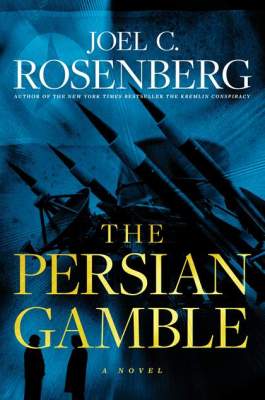Author Brad Meltzer (who also hosts several shows on the History Channel) once said “a thriller author’s job is to beat the headlines,” and nobody has done that better over the last fifteen years than Joel C. Rosenberg.
So known to predict future events that he was once nicknamed “a modern-day Nostradamus,” Rosenberg has been right on the money regarding a number of issues both in the States and, where he seems to really specialize, the Middle East. Consider this: Before everyone and their brother was writing about ISIS and making them the bad guy in their stories (Brad Thor, Daniel Silva, John Lescroart, Ben Coes, Kyle Mills, Alex Berenson, Mark Greaney, etc.) Rosenberg wrote them into his 2015 thriller The Third Target, which originally wasn’t slated to come out until further into the year, but was pushed up to a January release by Joel’s publisher, Tyndale House Publishers, because the events of the book were seemingly playing out in real time.
So, while everyone else was focused on other Middle Eastern terrorist groups, Rosenberg drew attention to the threat of ISIS. Now, as most thriller writers are finally pivoting away from ISIS, Rosenberg once again leads the charge, having set his sights on Russia—the main antagonist of his last novel, The Kremlin Conspiracy. At the time, in an exclusive interview, Rosenberg told me, “I needed a new challenge and wanted to focus on a different part of the world, different enemies. In this case, I kept finding myself drawn to Russia.”
Bottom line: Nobody has read the tea leaves quite like he has . . . so if you want to see where the conflict between the U.S. and Russia might one day be headed, and what it could look like when we get there, Rosenberg’s books offer a chilling and sobering take on things—wrapped inside a heart-pounding thriller.
Now, after the success of The Kremlin Conspiracy, Rosenberg is set to release his highly-anticipated follow-up, which continues the story of former secret service agent Marcus Ryker, who’s teaming with a high-valued Russian with direct ties to the president to try and stop World War III before it’s too late. Just before heading out for his book tour, Rosenberg, who lives with his family in Israel, agreed to another Five Questions piece, and I asked him about everything from how he came up with the plot details for this one to whether or not he feels pressure to continue trying to predict the future in his stories.
See the full Q&A below, then make sure to order your copy of The Persian Gamble, in stores everywhere on Tuesday, March 12th.

TRBS: Wow. The Persian Gamble might be your fastest, most action-packed novel yet. How did you come up with the plot details for this one?
Rosenberg: Thanks, Ryan. I have to admit, I had more fun writing The Persian Gamble than any of my previous novels. It’s an intense, high-speed story and I never hit a section where I felt the story bogged down.
Now, the idea for The Persian Gamble was actually borne out of the friendships I’ve been fortunate to make in recent years with three former Directors of the Central Intelligence Agency. When I’m with these guys, I like to ask them, “What worries you? What keeps you up at night? What’s coming up over the horizon that we should pray never comes to pass but might make a good novel?” And their answers are as chilling as they are fascinating.
In this novel, the plot has two key elements.
First, the Iranians are trying to secretly buy operational nuclear warheads from the North Koreans while publicly pretending to adhere to the JCPOA (the Joint Comprehensive Plan of Action, a.k.a., “the Iran nuclear deal”).
Second, the Americans, Israelis, Saudis and the Emiratis find themselves quietly yet feverishly working together to figure out exactly what deadly game the Iranians are playing and how to stop them while there’s still time.
In talking with each of these former CIA directors – and with other current and former senior intelligence officials in U.S. and throughout the Middle East – I’ve grown increasingly concerned about how closely the Iranian regime has become to the Russians and the North Koreans. Tehran is buying weapons systems and technology from Moscow and Pyongyang, as well as the economic and political ties between these three countries are steadily deepening.
This is chilling. Really nightmarish stuff. Russia, Iran and Moscow are the new “Axis of Evil.” Not one of them are driven by the same political ideology or religious theology. Vladimir Putin, Kim Jong Un, and the Ayatollah Khamenei could not be more different in their upbringing, their education, or their current world views. But they have one thing in common: they hate the United States and the Western alliance with a vengeance, and they are each entirely determined to subvert and destroy the West and maximize their own power, wealth and global influence.
So, the question I began asking was this: What if the regime in Tehran decided one day to use the $150 billion in cash they received from the West for agreeing to the “Iran nuclear deal” to secretly purchase fully operational nuclear warheads from the cash-starved regime in Pyongyang, and then bring those warheads into an Iranian harbor, right under the noses of the CIA and the Mossad? Would that be possible? I think so. Would it be an enormously risky gamble? Absolutely. But might the ayatollahs conclude the gamble was worth it? They might. So that “what if?” question became the basis of The Persian Gamble.
TRBS: What kind of research did you have to do before actually sitting down to write?
Rosenberg: The research is hands-down the most fun part of writing a thriller. Doors open to people you never expected to meet. Invitations come out of the blue. Information comes from the strangest places. And it all becomes ingredients in cooking up the stew.
As far as I’m aware, I’m the only author of American political thrillers that deal with Middle East themes that has actually had the opportunity not just to meet but to really get to know the leaders of Israel, Jordan, Egypt, the United Arab Emirates, and Saudi Arabia.
I have to say, it’s been extraordinary to be invited to come to their palaces. Have mint tea with them. Spend hours in conversation with them. Asking them about a wide range of issues, but especially about the nature of the Iran threat. Spending time, as well, with their political and foreign policy advisors, and their intelligence officials and military commanders.
Some of these are highly controversial, highly complex men. Each are larger than life characters. I often find myself wanting to write a non-fiction book about them. But for now, novels are my focus. And while I respect any request they make to keep certain things off the record, I certainly absorb what I see and hear and taste and imagine and I weave such things into my novels.
I’ve always been struck by what Sun Tzu wrote in his famous treatise, The Art of War. “What enables the wise sovereign and the good general to strike and conquer, and achieve things beyond the reach of ordinary men, is foreknowledge. Now, this foreknowledge cannot be gotten from ghosts and spirits, cannot be had by analogy, cannot be found out by calculation. It must be obtained from people, people who know the conditions of the enemy.”
Sun Tzu was absolutely right. Wars can only be fought and won with good intelligence. The same is true with writing political thrillers. I love that the vast majority of my readers are salt-of-the-earth, everyday Americans and Canadians, from all kinds of political, religious and racial backgrounds. At the same time, one of my readers is Vice President Mike Pence. Another is Secretary of State Mike Pompeo. Another is Jordan’s King Abdullah II. Another is Jason Greenblatt, the senior White House negotiator on the Arab-Israeli peace plan. And in order to hold the interest of people like this, the books have to be so well-researched that they feel at once crazy dangerous and yet somehow plausible to people in the know.
TRBS: What is your writing process like? Do you outline your novels before you write them, have a target word count that you try to hit each day?
Rosenberg: Before I start a new book, I develop an outline and go over it with my friend and literary agent, Scott Miller, at Trident Media in New York, and of course with my publishing team. I used to write a very detailed treatment, thirty to forty pages, but they’re not nearly so long anymore.
The first half of my year involves writing a novel in January and February, then doing a book tour in March for the book I wrote last year, then getting back to work on the new manuscript. The deadline is usually on or around June 1st. Summer is for editing and fine-tuning, working closely with the editorial team at Tyndale. And the rest of the year is mine. Family. Friends. Catching up on books I haven’t had time for. Researching the next book. Traveling to meet new people. And working more closely with our non-profit organization, The Joshua Fund.
During the writing season, I typically work on the manuscript from 10am to about 4pm. Of course, I’m living in Israel – in Jerusalem, actually – these days with my wife and sons. So at 4pm my time, it’s only 9am on the East Coast. That’s when I shift to respond to emails, make calls, and so forth. Evenings are for family and friends. It’s actually a really nice rhythm. I have to say, I really love the writer’s life!
TRBS: You’re known for having successfully predicted things in your books. Is that something you try to do, and what’s your secret to beating the headlines?
Rosenberg: Actually, it’s not something I’m trying to do. I’ve been called a “modern Nostradamus” and so forth, but it’s not true. I’m not a psychic or a clairvoyant or a prophet. I write about worst-case scenarios, about things that could happen but I hope and pray will never happen.
TRBS: Lastly, what’s next for you now that The Persian Gamble is set to come out?
Rosenberg: Best case scenario: Vladimir Putin denounces The Kremlin Conspiracy. The Ayatollah Khamenei denounces The Persian Gamble. Both call for a worldwide ban on reading my novels, and re-print orders go through the roof.
Worst case scenario: Putin poisons my next cup of tea. Tehran issues an assassination fatwa for me like they did for Salman Rushdie back in the 1980s. And I have to enter the witness protection program and write from a cave.
Most likely scenario: I finish the book tour (including speaking at the Ronald Reagan Presidential Library, which I’m really looking forward to), come back to Israel, hug my wife and kids, finish the next manuscript, and continue on with my semi-normal life.
I’ll keep you posted.
Praised as “one of today’s finest book reviewers” by New York Times bestselling author Gayle Lynds, Ryan Steck (“The Godfather of the thriller genre” — Ben Coes) has “quickly established himself as the authority on mysteries and thrillers” (Author A.J. Tata). Steck also works full-time as a freelance editor and pens a monthly thriller column for CrimeReads. For more information, be sure to follow him on Twitter and Facebook. He currently lives in Southwest Michigan with his wife and their six children.
